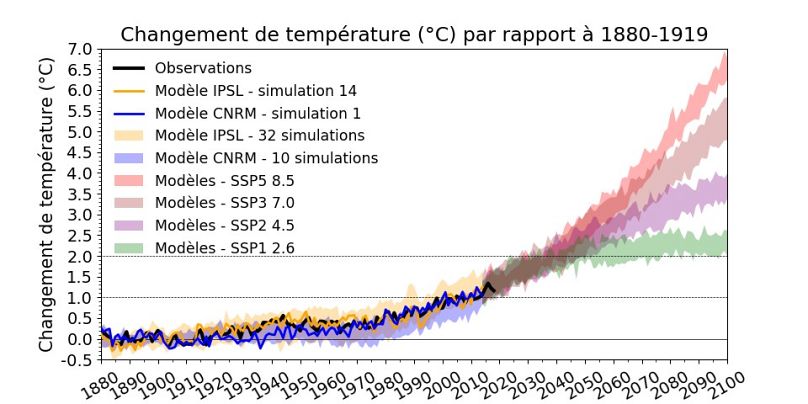Global average temperatures could increase 7℃ above pre-industrial levels by 2100 no matter how hard humans try to stop it, a team of French scientists claim in their latest worst-case scenario modelling.
Global average temperatures could increase 7℃ above pre-industrial levels by 2100 no matter how hard humans try to stop it, a team of French scientists claim in their latest worst-case scenario modelling.
The rise is more than the most pessimistic forecasts from the last models in 2012, which predicted an average rise of 6℃.
The modelling, involving three French research institutions, was part of an international effort to predict the possible paths for climate change.
They worked on two climate models in which they applied various scenarios of greenhouse gas levels and socio-economical situations.
Since the last modelling seven years ago, the tools available to scientists to make these predictions are more powerful, according to the Pierre Simon Laplace Institute in Paris.
Its head, Olivier Boucher, explained at a press conference: “We have better models now. They have better resolution, and they represent current climate trends more accurately.”
A higher accuracy allows researchers to have a regional approach and zoom in certain regions.
And this is not good news for the Arctic region. Both models and all scenarios show the Arctic will be the region that sees the highest rise in average temperature, which would have consequences for the rest of the globe.
The 7℃ rise, however, is considered highly unlikely by the scientific community as it is, in short, based on models where governments make no change to climate policy at all.
It is not the only no-action modelling but it is the one that combines several different factors, such as high population growth, high economic growth and strong reliance on fossil fuels, especially coal.
“Things are moving in climate policies, so we no longer are on this trajectory anymore,” says Pascal Braconnot, a specialist in climate modelling and palaeoclimatology and director of research in the CEA, quoted by French magazine L’Express.
The optimistic scenarios are actually more worrying
For some, the "better-case" scenarios could alarm even more. In the most optimistic modelling, for instance, the +2℃ level would be reached by 2040. The IPCC's latest report foresees serious consequences for warming of +1.5℃.
And still, to remain around ℃ by 2040 “the world [should] cut out CO2 emissions right now so as to reach worldwide carbon neutrality by 2060 while capturing 10 to 15 billions tonnes of CO2 in the atmosphere each year in 2100”, the group says in its report. If emissions are cut out later, the +2℃ mark might be reached much earlier.
Boucher says that “whatever we do, we have to expect more heatwaves, less frequent but more intense and which will last longer depending on the models”.
The French results come a week ahead of the UN climate summit which will start by the IPCC issuing its report on Oceans and Cryosphere on September 23.
Euronews will cover the event from the global climate strike on Friday, September 20 to the end of the summit and the second climate strike on the following Friday. Follow our extensive coverage on our page dedicated to climate.
A note on the study:
This work generated 20 million Gigabytes (20 Petabytes) of data after 500 million hours of calculation by French supercomputers. 20 centres for climate modelisation are involved worldwide in this 6th edition of Coupled model intercomparison project (CIMP6). CIMP aims at understanding better past, present and future climate changes induced by natural and/or human forcing. Global results from this 6th CMIP will be given in the IPCC report in 2020/2021.












